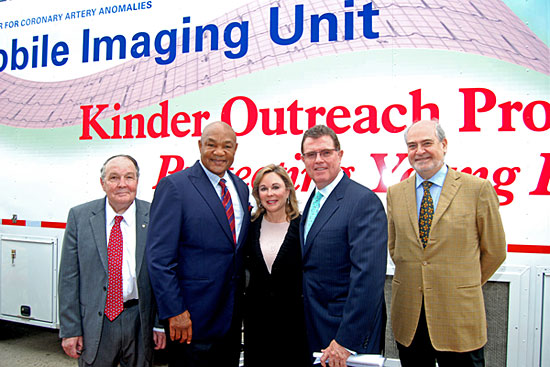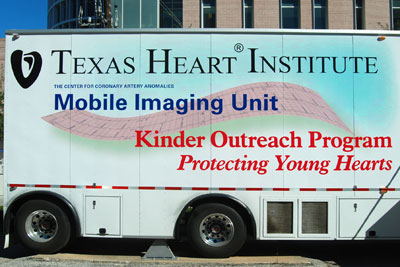Texas Heart Institute, Houston ISD Announce Medical Research Program to Screen/Study 10,000 Houston Students/Athletes for Heart Conditions Associated With Sudden Cardiac Death
Project Underwritten by Houston's Kinder Foundation
Houston, Texas (November 11, 2010) – The Center for Coronary Artery Anomalies (CCAA) at the Texas Heart Institute announced today that it is launching a research program that involves voluntary screenings of 10,000 Houston area middle school students for certain difficult-to-detect, congenital heart abnormalities that are thought to predispose young people to Sudden Cardiac Death (SCD). These tragic events recurrently grab headlines, especially when SCD strikes young athletes during sports competitions or training.
"Too often, we hear about a student/athlete who dies suddenly in the middle of a game or at a team practice," said Dr. James T. Willerson, THI President and Medical Director. "It's a problem with tragic consequences, and we want to do more to address it. Our methods for detection are the most accurate known."
[For an update on the progress of the study, read the editorial by Dr. Willerson and others, published in March 2011.]

Left to right: Dr. James T. Willerson, Texas Heart Institute President and Medical Director; former heavyweight boxing champion George Foreman; Nancy Kinder; HISD Superintendent, Terry B. Grier; and Dr. Paolo Angelini, Medical Director of the THI Center for Coronary Artery Anomalies. VIEW VIDEO.
|
Dr. Willerson was joined in the announcement at Welch Middle School by Houston Independent School District Superintendent Terry B. Grier and former heavyweight boxing Champion George Foreman, who is an honorary spokesperson for the program.
"This very important outreach effort and partnership between HISD and the Texas Heart Institute will not only benefit our students and their families, but it will save lives." said Superintendent Grier.
The project is being underwritten by a $5 million donation by the Kinder Foundation, founded by Houston philanthropists Rich and Nancy Kinder.
"We are immensely grateful to Nancy and Rich Kinder for their support in recognizing this as a significant problem and helping us address it in a meaningful way," said Dr. Willerson.
"Rich and I are delighted to support a great organization like the Texas Heart Institute in tackling a serious medical problem that exists in our community and throughout America," said Nancy Kinder, President of the Kinder Foundation. "We hope this effort will pay long-term dividends in improving the health of our students over the coming years."
"Undiagnosed HCM [hypertrophic cardiomyopathy] is a leading cause of sudden cardiac arrest (SCA) in children, especially in young athletes. However, SCA is largely preventable through proper screenings and early detection," says Lisa Yue, president and founder of the Children's Cardiomyopathy Foundation (www.childrenscardiomyopathy.org), a national nonprofit focused on research, education and awareness of pediatric cardiomyopathy. Ms. Yue counsels many families who have lost children to sudden cardiac arrest. "I am hopeful that this study will help us gain a better understanding of cardiac anomalies like cardiomyopathy and will encourage more heart screenings on a national level."
Cases, or suspected cases, of SCD make headlines with some regularity around the country, when a young student/athlete is stricken during a game or practice session. Parent Heart Watch, an advocacy organization that monitors such cases and supports early detection, maintains a web site, www.parentheartwatch.org that documents issues involved.
An abnormality known as hypertrophic cardiomyopathy can cause fatal abnormal rhythms in the heart, interrupting abruptly its function. In these conditions the heart is abnormally thick, which predisposed these individuals to develop such abnormal heart rhythms. Another condition involves abnormality in the major artery supply to the heart (coronary arteries), which can also lead to abnormal and life-threatening heart rhythms. Coronary artery anomalies and cardiomyopathies are about 70% of the recognized causes of SCD in U.S.
Under its agreement with the Houston Independent School District (and others being worked out with private schools in the Houston area), THI plans to screen the students using imaging technology and software provided by Philips Healthcare. The screenings will take place at selected schools over the next two years as part of a scientific study to help learn more about the heart abnormalities which affect primarily young people, and learn more about their prevalence in the broad population.

Initially, the CCAA study will use simple but comprehensive and accurate techniques to identify the carriers of potentially dangerous predisposing causes. This includes: 1) a brief history (personal and of the family); 2) an electrocardiogram (ECG); and, 3) a simplified screening program of magnetic resonance imaging (MRI). Such study will be carried out on any students at the selected schools whose parents agree to have their child screened. The MRI machine uses magnetic fields to take quite accurate "pictures" of the heart and its blood vessels. The ECG machine makes a paper tracing that shows the heart electrical activity. Each of the tests is "non-invasive" and does not use any needle or medication. Testing takes only about 15 minutes per student and there will be no cost to parents.
The MRI equipment, supplied by Philips Healthcare, has been fitted to a specially constructed mobile imaging unit that will be taken to schools for screenings. That program is expected to begin before the end of the year.
Dr. Paolo Angelini, a well-known THI cardiologist and a prominent specialist in this field, pointed out that this is a scientific study (not a clinical service, at this stage), which has been reviewed and will be monitored by an independent Institutional Review Board (IRB). It will follow all state and federal rules for such studies.
Angelini, medical director of the CCAA, also noted that SCD is reported to be associated more frequently with young athletes, probably because during training and especially during competition itself, they may exceed their usual level of physical activity, reaching levels well beyond those involved in clinical stress tests (which usually show negative in these cases).
"We hope to accomplish several critical objectives in this initial stage of the research," said Dr. Willerson, who will be the principal investigator for the study. "That especially includes: 1) a more clear definition of the specific conditions most likely to lead to SCD; 2) early detection, before a catastrophic occurrence, for those students who may be at risk. We also will seek to identify subpopulations among Houston's diverse student population that justify routine screening vs. generalized population-based screening, that may not be practically cost-effective and/or efficient.
"Adding to the body of medical knowledge through this study could potentially help guide schools all over the country who must weigh the risks against cost and practicality in requirements for sports physicals for student athletes," added Dr. Willerson.
THI is seeking additional community support for the project—particularly from Houston-based corporations. Houston-based Cameron recently signed on as the first major corporate sponsor of this effort.
THI's Center for Coronary Artery Anomalies is also working with the U.S. Army, which has been reporting for years a relatively increased incidence of SCD among recruits going through boot camps.
For media inquiries please contact:
Texas Heart Institute
Frank Michel ♦ 832-355-9510
Email: fmichel@heart.thi.tmc.edu
For THI and St. Luke's media profiles, see Public Affairs.



